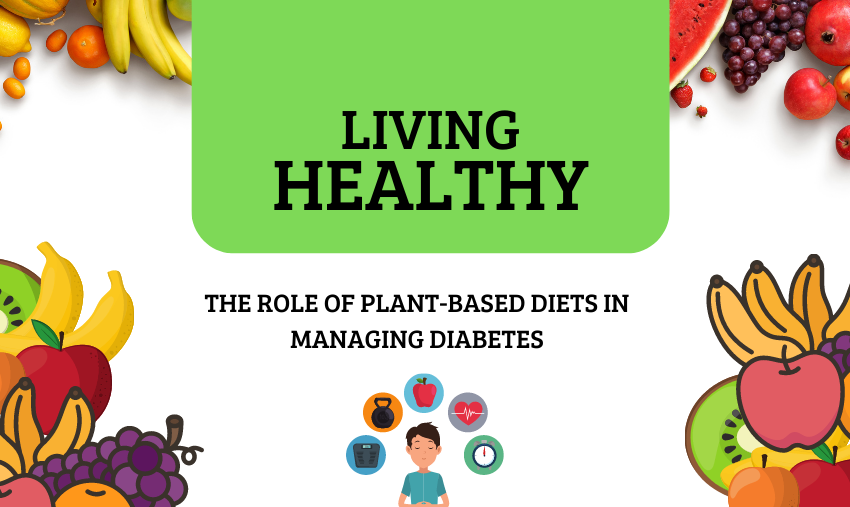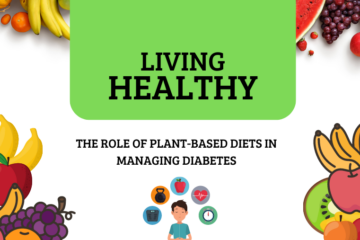Diabetes is a global health crisis of staggering proportions. According to the World Health Organization, an estimated 422 million people worldwide have diabetes, a number that is set to keep rising unless we take action. While medication and regular monitoring are crucial elements of diabetes management, research increasingly highlights the role of diet, particularly plant-based diets, in managing this condition.
In this comprehensive guide, we delve deep into understanding the role of plant-based diets in managing diabetes. We will explore how these diets work, what they entail, and the scientific evidence behind their effectiveness. Let’s get started!
Understanding Diabetes
Diabetes is a chronic metabolic disorder characterized by elevated blood glucose levels. It occurs when the body fails to produce enough insulin (a hormone that regulates blood sugar) or cannot use insulin effectively. This can lead to a build-up of glucose in the blood, which can damage the body’s organs over time, leading to complications like heart disease, kidney failure, and blindness.
There are two primary types of diabetes:
Type 1 diabetes, which is an autoimmune condition where the body’s immune system destroys the cells that produce insulin. People with type 1 diabetes require insulin injections for life.
Type 2 diabetes, the most common form, results from the body’s ineffective use of insulin. This type of diabetes is largely the result of excess body weight and physical inactivity.
It’s also worth noting other types of diabetes, like gestational diabetes, which occurs during pregnancy, and prediabetes, a condition that precedes the development of type 2 diabetes. Although this article focuses on type 2 diabetes, adopting a plant-based diet can also be beneficial in these other situations.
The Power of Diet in Diabetes Management
As a lifestyle disease, type 2 diabetes is heavily influenced by dietary choices. Modern diets high in processed foods, sugar, and unhealthy fats have contributed significantly to the surge in diabetes cases worldwide. In contrast, diets rich in whole, plant-based foods can aid in diabetes management, and in some cases, even reverse the condition.
The Science Behind Plant-Based Diets and Diabetes
A plethora of scientific studies over the past few decades have highlighted the effectiveness of plant-based diets in managing diabetes. These diets are naturally high in fiber, antioxidants, and healthy fats, and low in unhealthy fats and cholesterol.
Plant-based diets can improve insulin sensitivity and help control blood sugar levels in several ways:
High fiber content: Plant-based foods are rich in dietary fiber, which slows down the absorption of sugars into the bloodstream and prevents spikes in blood sugar levels. This steady absorption helps in maintaining a constant blood sugar level.
Low glycemic index (GI): Most plant-based foods have a low GI, which means they release glucose slowly and steadily. This can help prevent the sudden blood sugar spikes associated with high-GI foods.
Weight management: Plant-based diets are typically lower in calories compared to diets high in meat and dairy, making them beneficial for weight loss. Achieving and maintaining a healthy weight is crucial in managing diabetes since excess weight can contribute to insulin resistance.
Reducing inflammation: Chronic inflammation is often linked with insulin resistance. Plant-based diets are rich in antioxidants and other anti-inflammatory compounds that can help reduce inflammation.
Let’s look at the components of a plant-based diet that makes it so effective in managing diabetes.
Components of a Plant-Based Diet for Diabetes Management
A plant-based diet is rich in fruits, vegetables, legumes, whole grains, nuts, seeds, and plant-based proteins. It minimizes or excludes animal products, including meat, dairy, and eggs. Here’s how these components work in managing diabetes:
Fruits and Vegetables
Fruits and vegetables are the cornerstones of a plant-based diet. They are rich in dietary fiber, which can slow glucose absorption and prevent blood sugar spikes. They also provide a wealth of vitamins, minerals, and antioxidants that promote overall health and protect against diabetes-related complications.
Whole Grains
Whole grains, such as brown rice, oats, and quinoa, are a great source of complex carbohydrates. Unlike refined grains, whole grains have all parts of the grain — the bran, germ, and endosperm. Foods made from these grains are rich in fiber, which helps in managing blood sugar levels by slowing the absorption of sugar into your bloodstream and preventing spikes in blood glucose.
Legumes
Legumes like beans, lentils, peas, and chickpeas are an excellent source of plant-based protein and are rich in fiber, helping regulate blood sugar and keep you feeling full and satisfied. They are also packed with essential minerals like potassium and magnesium, which are beneficial for heart health — an important consideration for people with diabetes, as they are at increased risk for heart disease.
Nuts and Seeds
Nuts and seeds are high in fiber and healthy fats. They are also a good source of protein and can help manage blood sugar levels. Almonds, for instance, have been found to reduce the rise in glucose and insulin levels after meals.
Plant-Based Proteins
Plant-based proteins, such as tofu, tempeh, and seitan, along with lentils and beans, can be excellent substitutes for animal protein for people with diabetes. These plant-based proteins are lower in saturated fats and calories than animal proteins and can help in maintaining a healthy weight.
The Shift Towards a Plant-Based Diet
You don’t have to shift to a plant-based diet all at once. You can start by including more plant-based foods in your meals and reducing the intake of animal-based and processed foods. Here are some tips for adopting a plant-based diet:
Start with familiar plant-based foods: Begin with fruits, vegetables, and grains you enjoy and gradually try new ones.
Experiment with plant-based proteins: Replace animal protein with plant-based alternatives like beans, lentils, and tofu.
Plan your meals around vegetables: Instead of thinking of vegetables as a side dish, make them the star of your plate.
Read food labels: Choose whole foods over processed foods, and watch out for added sugars and unhealthy fats.
Consult a dietitian or a healthcare professional: They can provide personalized advice and meal plans based on your nutritional needs and preferences.
A Holistic Approach to Diabetes Management
While the impact of a plant-based diet on diabetes management is significant, it’s essential to remember that diet is just one piece of the puzzle. A holistic approach to diabetes management should also include regular physical activity, adequate sleep, stress management, regular monitoring of blood glucose levels, and adherence to prescribed medication, if any.
Exercise helps the body use insulin more efficiently, can help control weight, and improves cardiovascular health. The Diabetes Free Life program, for example, combines a plant-based diet with yoga and other exercises, along with meditation, to manage diabetes effectively.
Are you ready to give plant-based diets a try? Start by incorporating one plant-based meal into your day and gradually increase from there. Check out our collection of plant-based recipes here for inspiration.
Conclusion
The prevalence of diabetes is rising at an alarming rate. However, the power of a plant-based diet in managing and even reversing this condition offers hope. Through consuming whole, nutrient-dense plant foods, individuals can significantly improve their blood sugar control, lose weight, and improve their overall health. As we continue to uncover the benefits of plant-based diets, it’s clear that the food we eat can be our most potent medicine.






